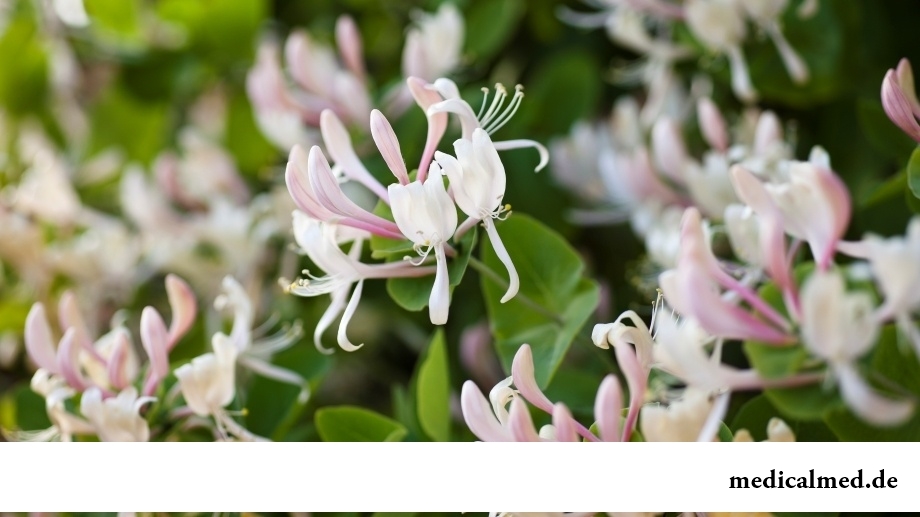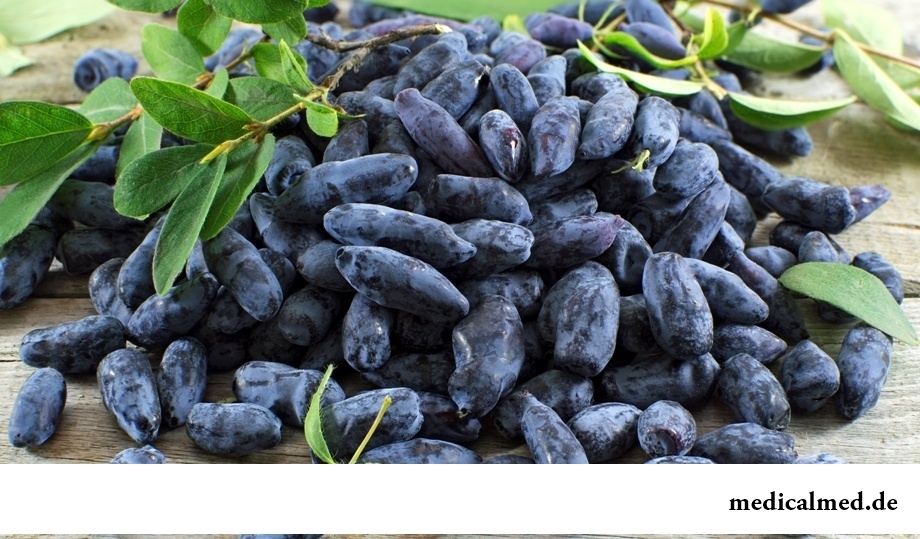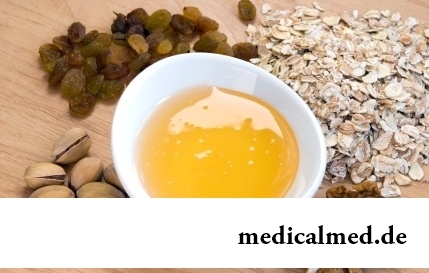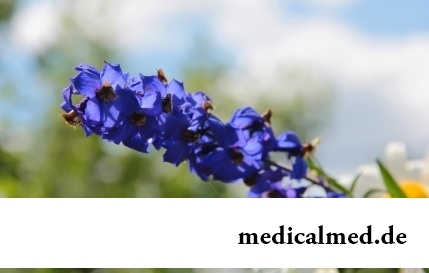





Honeysuckle
Honeysuckle – a plant from a sort of long-term bushes. The name of a honeysuckle, usual for us, in the wild nature is expression "wolf berry". Can grow in the form of the creeping, curling or upright bush with large fragrant flowers of light color (white, light blue, light pink or light yellow). Height of a bush of a honeysuckle can reach 2 meters and more.

Fruits or berries of a honeysuckle differ in blue or dark-blue color, with a characteristic wax plaque, in a form they can be roundish or extended. Honeysuckle berries are always located in pairs, even sometimes growing together among themselves. Honeysuckle berries something taste like blueberry: they, depending on a grade, can be sweet, sweet-sour or even to taste bitter a little. Some grades of a honeysuckle edible have the taste similar to pineapple or a wild strawberry.
Honeysuckle ordinary or wolf berry grows in our width everywhere. In Russia 3 types of an edible honeysuckle grow:
1. Altai;
2. Kamchatka;
3. Caucasian.
Besides, about 14 types of wild-growing species of this plant live in our country. Such regions as the Far East, Sakhalin and Eastern Siberia are rich with a honeysuckle.
The most widespread grades of a honeysuckle edible, grown up in the territory of Russia:
- Leningrad giant;
- Bluebird of happiness;
- The Tatar;
- Blue spindle;
- The curling honeysuckle.
The main difference of an edible honeysuckle from a noxious plant is color of berries: blue and almost black fruits can be eaten, and here berries of red and orange color are poisonous.
Useful properties of a honeysuckle
The honeysuckle has a number of useful advantages. As the plant blossoms in the early spring, berries of a honeysuckle become ripe at the beginning of summer, and at this time, as we know, the majority of plants does not fructify yet.
Honeysuckle berry – the owner of extremely rich set of curative substances:
- Magnesium;
- Monosugar;
- Phenolic connections;
- Ascorbic acid;
- Group B vitamins;
- Organic acids;
- Pectins;
- Tannins;
- Microelements;
- Macrocells.
On the content of magnesium a honeysuckle edible – the richest product, in it at it is not present equal among other plants and berries. In berry of a honeysuckle the optimum combination of the most valuable biologically active agents which make powerful recreational impact on a human body is revealed.
Caloric content of a honeysuckle makes about 30 kilocalories on 100 grams of berries.
Useful properties of a honeysuckle play a large role in maintenance of cardiovascular activity. Fresh berries of a honeysuckle well tone up an organism, render powerful fortifying property. Juice of berry of a honeysuckle saves from many skin diseases. Besides, berries of a honeysuckle possess antiscorbutic and anti-ulcer actions.
Useful properties of a honeysuckle are defined not only by berries, but also other parts of a plant. So, leaves, bark, inflorescences and branches of a honeysuckle have the following properties:
1. Diuretic;
2. Cholagogue;
3. Disinfecting;
4. Antiinflammatory.
Bark of a honeysuckle gathers in the early spring and is dried up.
Use
For removal of hypostases and at disorder of intestines (diarrhea) use broths and infusions from flowers and leaves of a honeysuckle.
Fresh broth from leaves and branches of a honeysuckle is used for washing of eyes at conjunctivitis, for rinsing of a throat at an inflammation of upper respiratory tracts (quinsy, laryngitis, tracheitis, a SARS). Besides, at catarrhal diseases sudorific and febrifugal properties broth from leaves and branches of a honeysuckle has. Inside accept infusion of leaves of a honeysuckle at dropsy and cystitis.
Fruits of an edible honeysuckle recommend to use in food to people at whom nasal bleedings are observed.
Thus, useful properties of a honeysuckle are applied by traditional medicine to treatment of the following diseases:
- Anemia;
- Vascular diseases;
- Hypertension;
- Problems with a stomach, intestines and digestion;
- Problems with a liver;
- Bleedings (fragility of blood vessels);
- Diseases of a gall bladder;
- Malaria;
- Migraine.
Also it will be useful for that who has a problem with digestion of food to use honeysuckle berries: it will help to adjust secretory function of a stomach and to increase its digestive ability.
Many skin diseases will respond to treatment when using outwardly of juice from honeysuckle berries. Thus, it is possible to cure deep ulcers, deprive, eczema and psoriasis. Painful symptoms at rheumatism and arthritis are perfectly removed by a hot bathtub with branches and bark of a young bush. Use of broth from branches and bark of a honeysuckle helps to improve growth of hair, to remove hypostases. If the person has a small appetite, broth from branches and leaves of a honeysuckle will help to improve it.
Even if there is actually, nothing to treat, physicians recommend to use honeysuckle berries, to drink broths from its leaves and colors for the preventive purposes. Their regular reception will allow to strengthen immune system and to saturate an organism with vitamins, this council is especially urgent in the spring.

In addition to medicine, this plant found the application and in other areas. A honeysuckle a beautiful bush and therefore it is often grown up for registration of gardens and parks. In cookery original taste of berries of a honeysuckle is widely used. So, they are applied in food in the following types:
- Crude;
- Jam;
- Jelly;
- Jam;
- Compote;
- Juice;
- Wine;
- Dried;
- Frozen.
Harm of a honeysuckle, contraindication to its use
Use of an edible honeysuckle in food in reasonable quantities has no contraindications, but if treatment is made by poisonous grades, it is necessary to observe carefully a dosage and to be very careful.
The overestimated honeysuckle berry doses, even an edible look, can provoke the following disturbances of health:
- Secondary hyperglobulia (sharp increase in quantity of erythrocytes and hemoglobin in blood);
- Allergic reaction (diathesis at small children);
- Diarrhea (frustration of a chair).
Scientists from the Oxford university conducted a number of researches during which they came to a conclusion that vegetarianism can be harmful to a human brain as leads to decrease in its weight. Therefore scientists recommend not to exclude completely from the diet fish and meat.

Not without reason doctors say that 90% of diseases begin or develop because of misoperation of intestines. Disturbance of its functions связ...
Section: Articles about health
For many women the word "fat" sounds as a sentence. In aspiration to an ideal figure they try to exclude, first of all, from the menu all dishes containing fats without having at the same time a clear idea of a role of these substances in exchange processes, and about an afterbirth...
Section: Articles about health
No, probably, the person who would not have cold. Cold, cough, a headache – these symptoms are known to everyone. The peak of catarrhal diseases is the share of fall. SARS already came to schools and kindergartens, flu slowly makes the way to the cities, in a word, winter close!...
Section: Articles about health
Let's begin with the fact that a separate illness which is called "adjournment of salts", just does not exist. In practice this household name of plank beds...
Section: Articles about health
The winter swimming in open reservoirs called in our country by "winter swimming" – officially recognized sport and one of the most extreme ways of a hardening of an organism. This occupation has an old story and adherents in many countries. Are annually carried out...
Section: Articles about health
Healthy lifestyle today in fashion, and many parents think of that the child from the early childhood played sports. Trainings will help it to become strong and hardy, will improve coordination of movements, and also will exert positive impact on mentality: it will become more collected and purposeful....
Section: Articles about health
Long time antibiotics were considered as a panacea from all diseases and were appointed even at insignificant symptoms of an infection. Even now...
Section: Articles about health
Is told about advantage of domestic animals for development of the child much. But many parents nevertheless do not hurry to bring pets as are afraid that they can do harm to health of children. What troubles can really trap kids and how to make with...
Section: Articles about health
Deciding to get rid of an addiction, not all imagine what effects it is necessary to face. Process of refusal of smoking causes quite essential discomfort in most of people: differences of mood, a sleep disorder, fatigue, decrease in physical and intellectual activity and a number of other symptoms reducing quality of life. Abstinence can be strong: an essential part of attempts comes to an end leaving off smoking failure, and people are returned to the use of cigars...
Section: Articles about health
What will only not be thought up by persons interested to have a beautiful figure. Here the last innovation – for weight loss needs to be eaten greasy food. Give ра...
Section: Slideshow
An eye of the person daily experiences considerable strain. The problem of preservation of sight is for many years directly connected with a question of supply of tissues of eye enough oxygen and nutrients. This task is carried out by small vessels – capillaries. For holes...
Section: Articles about health
Eyes – unique body on the structure thanks to which the person obtains about 80% of information on the world around: about a form, color, size, the movement, and also many other parameters of objects or phenomena. But whether much we know about the most valuable sense body which, according to the scientist Sechenov, provides us about one thousand various feelings a minute? Let's consider 10 most surprising facts about eyes and sight....
Section: Articles about health
More than a half of the married couples which faced prostatitis – leave. The new broadcast "Female View of Prostatitis" will help to learn...
Section: Articles about health
Coffee – favourite drink of many. For the last decades it more than once already declared very harmful, extremely useful and even necessary for normal life activity. In spite of the fact that this product became for us usual for a long time, exists much...
Section: Articles about health
Reactive pancreatitis - the disease which is characterized by inflammatory process in a pancreas which arises most often because of excess activity of digestive enzymes. It − the emergency state which treatment has to take place in surgical department under control of doctors. The acute inflammation of gland can become the reason of its transition to a chronic form, and also development is purulent - necrotic pancreatitis which the extensive necrosis of fabrics can follow. Zabolev...
Section: Articles about health
It is impossible to imagine human life in which there would be no plants. Practically in each apartment and any of productions...
Section: Articles about health
Climax - process of fading of reproductive function of an organism in process of its aging. At women the main sign of its approach is the termination of a menstrual cycle. Officially the menopause is diagnosed when periods are not observed in течен...
Section: Articles about health
Heart disease and blood vessels lead to disturbance of blood supply of bodies and fabrics that involves failures in their work, deterioration in health of the person, decrease in its working capacity and standard of living. Annually more than 17 million inhabitants of our planet perish from pathologies such....
Section: Articles about health
Statistically cystitis 25-30% of women up to 40 years have. With age this indicator raises, besides many do not get in to become...
Section: Articles about health
Each of us faces from time to time that other people need the immediate help. We react to it differently: one at once call doctors and police, others rush to victims and try to save them independently. Some at all...
Section: Articles about health
The saying "the rich do not know how the other half lives" is known to all. In a broad sense it is that we can not always understand the person whose features of a state are unknown to us. If with physiological characters of diseases the situation is more or less clearly (having noticed them, we realize that to the person nezdorovitsya), then with symptoms of the illnesses affecting the mental sphere everything is much more difficult. Not absolutely usual behavior is quite often perceived surrounding as a ridiculous eccentricity, or that much ху...
Section: Articles about health
The stroke is one of the most widespread diseases of the person, annually in the world about 6 million cases эт are registered...
Section: Articles about health
You are office worker, the driver, the fan of winter sports or do not think of life without bicycle? You lead a slow-moving life and you move on the city only on the car? You have no constant partner and you do not love the protected sex? Attention! You one...
Section: Articles about health
Food with the increased content of sugar is attractive to most of people - it is scientifically confirmed fact. Business here not in intemperance or dissoluteness: the sweet food is associated since childhood with feeling of rest and safety which tests the kid when it absorbs maternal milk. Besides, getting into a human body, sugar strengthens production of "happiness hormones" which all of us so need. And still life of sweet teeth seldom happens cloudless: their too big loss...
Section: Articles about health
Each woman has preferences in the field of use of those goods which help us to look good, feel се...
Section: Articles about health
Practice of hypnotic impact on consciousness of the person contains about two millennia. During this time scientists managed to learn a lot of things about a phenomenon of hypnosis and learned to facilitate a condition of the patients having heavy illnesses with its help....
Section: Articles about health
From sexual contacts each person can test insufficiently strongly expressed sexual desire or lack of satisfaction from time to time. However when it happens regularly, it is an occasion to think about health. Most of people does not hurry to ask similar questions physicians: one consider that they will be able to cope with malfunctions independently, others hesitate to report to strangers about so delicate problems and hope that troubles will stop by itself....
Section: Articles about health
